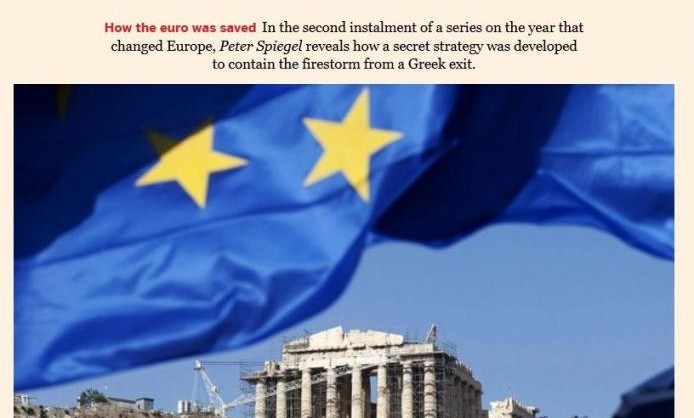The work on plan Z regarding the way Europe could handle Greece’s exit from the eurozone begun in January 2012, according to what Peter Spiegel revealed in his recent article published on Financial Times.
It was such a secret plan that there were no official documents nor any emails about it. The plan was largely overseen by four men, Jorg Asmussen of ECB, Marco Buti of European Commission, tThomas Wieser of Euroworking Group and Paul Thomsen of IMF.
During an official dinner two weeks before the Greek elections of 2012, Mrs Merkel asked for reassurance from Mr Barroso that a plan was prepared in case Greece rejected the bailout conditions and Grexit ensued. Mr Barroso said that there is a plan and offered to show it to Mrs Merkel. However, she refused to take it since under the German system, such documents can be requested by the Parliament and Mrs Merkel would be obliged to show such planning in German Parliament.
According to Financial Times, the plan included detailed actions on how to create a new financial system from scratch.
In Washington, IMF officials prepared an action plan of 20 pages. Based on their experience on bank runs and currency crises, the IMF program included actions such as turning off all ATMs and reintroducing border controls to prevent massive capital flight.
The ECB officials studied Argentina’s example of issuing IOUs during the country’s crisis in 2001, since the euro notes and coins circulating in Greece would no longer be legal.
Among the options was issuing Greek IOUs worth about half the value of those euros.
Similar work was also carried out in Brussels. Some of it had to do with the EU legislation: How it would be possible for such an economy to remain member of EU market, which requires a free flow of goods? What were the legal authorities to set up capital controls?
How euro was saved
Provopoulos, the governor of Greece’s central bank, every day summoned a small “emergency team” of aides to his offices at 6pm to review the health of the nation’s banks. But, what he was told on June 15 2012 socked him a lot.
It was the Friday before parliamentary elections – the second national vote- and the country was in panic. On that day, Greeks withdrew more than €3bn from their bank accounts, or about 1.5 per cent of the country’s entire economic output. The Bank of Greece had watched people moving money from their banks to their mattresses for nearly three years, but never on such a scale.
Then, under Provopoulos orders, the central bank managed to transfer extra euros from other parts of EU to ensure that it could meet even massive capital flight.
Greece’s exit could become reality due to two causes.
Firstly because the banks could no longer receive funding with Greek bonds guarantee. The bonds would not be accepted if Greece went bankrupt. The reason of bankruptcy would be due to the discontinuation of funding through the support program.
The second reason would be massive capital flight.
Lucas Papademos’s concerns
According to Mr. Papademos, Greek authorities expressed their worry that things could get out of control if parties were unable to form a government.
During a teleconference, the seven European leaders before meeting at G20 summit at the Los Cabos agreed to support Greece if it abided by the existing bailout’s conditions. There would be no renegotiation.
According to the Financial Times, German Chancellor oscillated between accepting Grexit and rejecting it. Her advisers were divided into two parties, the “domino” party and the “infected leg” party. The first party warned that if Greece left eurozone, Europe would have to face a domino effect “potentially followed by large-scale bank runs in Portugal, Italy and Spain”. Whereas, the “infected leg” party, supported strongly by Schauble, argued that “cutting off Greece would allow the rest of the eurozone to return to health”
Mr Schauble was determined to adopt Grexit plan but he was also more willing to increase Germany’s contribution to the bailout fund to support other countries when Greece was out of Eurozone.
Analyses of the Ministry of Finance of Germany even estimated that the Grexit plan would cost less than supporting forever a bankrupt country .
Mrs Merkel rejected finally Grexit plan as her financial advisers could not say what would happen in such a case and Chancellor did not want to act with uncertainty.
Samara’s “U-turn” convinced Merkel
As Peter Spiegel mentions, Barroso played an important role. He visited Antonis Samaras after the elections and convinced him that he should not request a program revision and that he had to execute the existing requirements for at least a year. Only after that he could raise the issue of revision.
Samaras was convinced then and according to the FT article edited his statement saying that he was preparing to implement immediately the agreed program.
Only then, Mrs Merkel, after six weeks of thought and reflection decided to reject the Grexit plan and then she made a symbolic trip to Athens. Also, during the next Eurogroup meeting Greece was promised more debt relief as soon as it achieved a primary budget surplus.
































